Commodity-trading platform DMCC Russian oil trade: Dubai pulls out all the stops to edge out Switzerland
Agathe Duparc and Manuel Abebe (in collaboration with Robert Bachmann), November 21, 2023
It's a morning like any other on the ground floor of the gigantic Almas Tower, the headquarters of the Dubai Multi Commodities Centre (DMCC). We are at the nerve centre of this organization – one of the world's largest commodity-trading platforms, established in 2002 by the Dubai government. Nearly 23,000 companies are registered here, mostly trading firms from all over the world, active in diamonds, cereals, tea, coffee and hydrocarbons.
At the entrance, visitors are greeted by the portraits of the three pre-eminent sheikhs of the United Arab Emirates, including that of Mohammed bin Rashid al-Maktoum, the emir and benefactor of Dubai, whose fortune is estimated at $14 billion. Groups of people are waiting for their badges, while the procession of lifts continuously travels between the 68 floors. One man, taking me for a businesswoman, slips us his business card, while mentioning that his company, which provides services of every kind, is accredited by the local government and can meet “any need”. “You’re from Switzerland? Oh, lovely!” The conversation wouldn’t go on much longer.
 ©
Panos
©
Panos
In the circular gallery where restaurants and cafes are located, a model of the business district is on display: 87 skyscrapers planted like trees around an artificial lake, covering an area of more than 200 hectares. These towers accommodate offices, luxury residences and hotels, not to mention gyms, restaurants, nurseries and shops for dogs and cats, which are in great abundance. Nearly 100,000 people work in this free zone. This is a place where people work DMCC, live DMCC and eat DMCC. The abbreviation has even given its name to a metro station.
This hive of activity is going about its business as usual when the news breaks: DMCC has been named “Global Free Zone of the Year 2023” for the 9th year in a row (awarded by the Financial Times’ FDI Magazine). Two young women in beige trench coats and hats are taking a torrent of photos, while hostesses in sequined dresses offer smiles and white roses. Delighted guests pose behind a frame in the colours of DMCC as they pass by. The whole event doesn’t last more than half an hour.
-
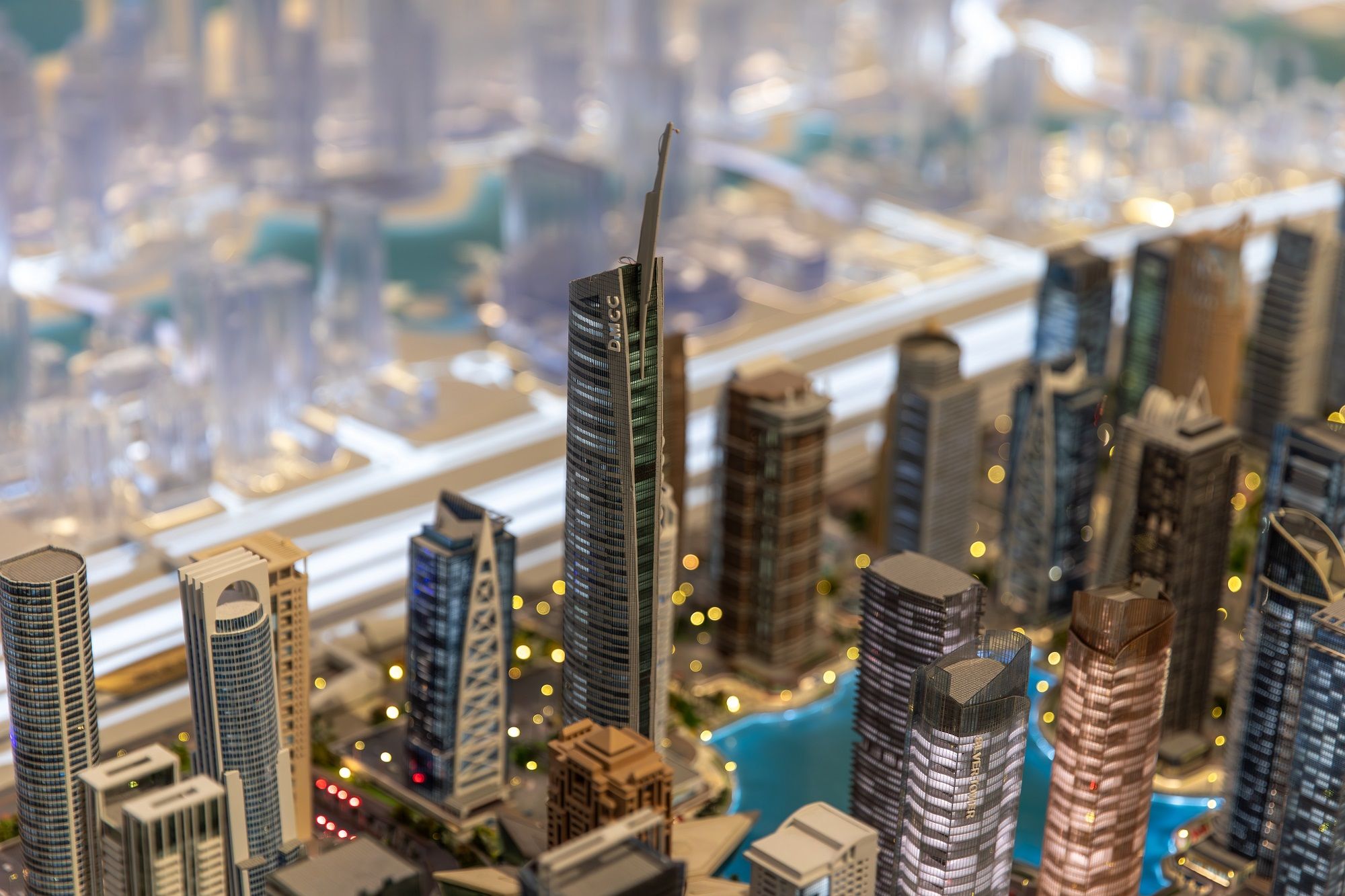 ©
Panos
©
Panos
-
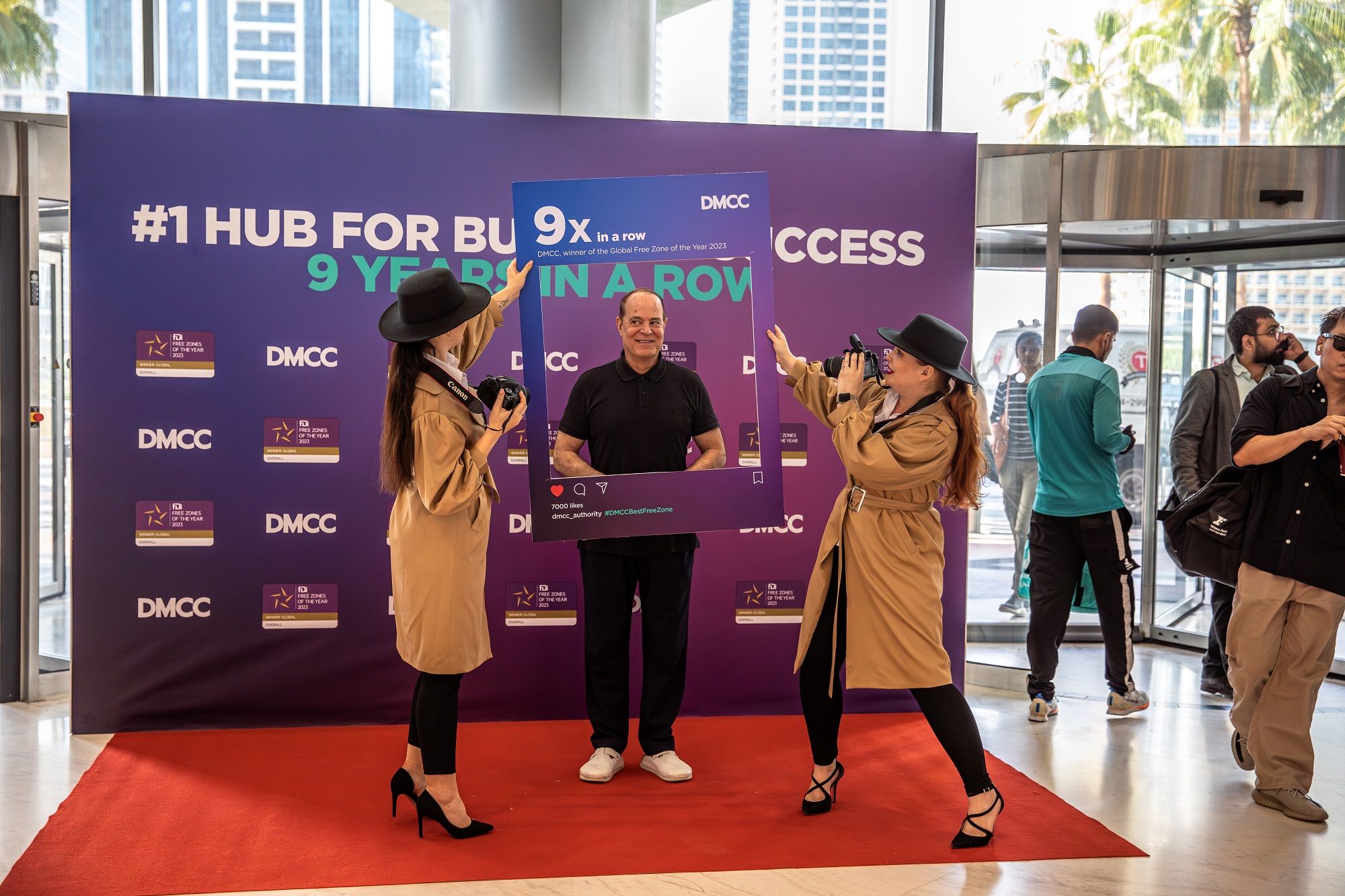 ©
Panos
©
Panos
-
 ©
Panos
©
Panos
DMCC is just one of 30 special economic zones in Dubai. But since the sanctions and oil embargo imposed on Russia came into effect – on 5th December 2022 for crude and 5th February 2023 for refined products – this city has established itself as the preferred jurisdiction for trading companies which want to continue doing business with Russia on the quiet. Especially those that previously operated from Switzerland. In September 2023, a DMCC delegation held a road show in Geneva and Zurich. DMCC director Ahmed bin Sulayem announced there that in the past two years, the number of Swiss companies registered in the free zone had increased by 30%.
The United Arab Emirates, preoccupied with its tremendous economic growth, has not applied sanctions, and displays a benevolent neutrality towards Russia and its war of aggression. Dubai companies are therefore not required to buy Russian oil within the “price cap” set by the West (no more than $60 for a barrel of crude; $100 for diesel and kerosene; $45 for some fuel oils), whereas traders based in Switzerland and in the European Union (EU) and G7 countries must comply with the cap in order to continue trading with Moscow, as long as the oil is delivered to countries which do not apply sanctions. This key measure was implemented to allow Russia to continue to sell its products – an absolute prerequisite to avoid a surge in oil prices – while reducing the revenues that fuel Vladimir Putin’s war machine in Ukraine.
Picking up Russian oil flows
No-one is surprised here by the fact that Dubai, which is the intermediary between the Western world and the BRICS countries (Brazil, Russia, India, China and South Africa), has, in just a few months, become the new hub for trading Russian oil, threatening to usurp Geneva’s position. According to our estimates, 50 to 60 percent of Russian crude oil was traded in Switzerland before the war in Ukraine, mainly in Geneva.
 ©
Panos
©
Panos
Public Eye has been able to obtain Russian crude oil export declarations, completed by suppliers, from Russian customs between the beginning of January and end of July 2023. In addition to information about volumes purchased and prices paid, this data also provides details of the ports of loading in Russia, as well as the names of sellers and buyers.
The revelation arising from all this: in the first seven months of 2023, companies registered in Dubai (all free zones combined) claimed the lion’s share of the volumes purchased. They bought more than half the volumes of crude oil announced for export from the four main Russian ports (Ust-Luga, Primorsk, Novorossiysk, Kozmino) worth at least $14 billion. Six of the top-ten privately-held purchasers of seaborne Russian crude oil are based in the United Arab Emirates.
Our analysis highlights how, in just one year, the global trade map has been redrawn to show that volumes previously sold from Switzerland and Singapore by private traders are now being handled mainly from Dubai and Hong Kong.
“Dubai has always sought to protect its economy against global political fluctuations. Currently, the authorities want to diversify and pick up the Russian oil trade. They’re doing an amazing job!” reckons the analyst at a trading firm who left the tranquillity of Switzerland a year ago to plunge into the torrid environment of the Emirates. “Dubai’s appeal is not new. Banking secrecy was ended in Switzerland, followed by Covid-19, but since the outbreak of the war in Ukraine, the movement has rapidly accelerated and everyone wants to be here,” he explains, agreeing only to talk to us on condition of anonymity. A request shared by the dozen or so people we interviewed.
The industry is mired in conjecture, split between those who believe that this is but a temporary state of affairs and those who believe that a point of no return has been reached. A few months ago, a Russian trader who worked for Geneva's largest traders called it a “joke” to talk about a retreat to Dubai. He highlighted the total absence of any tradition of trade financing within the Emirati banks. We met him at the bar of a large hotel in the DIFC (Dubai International Finance Centre). He now predicts that “in the next ten years, no-one will be able to compete with Dubai,” where he now spends half his time working as a consultant.
However, he believes that Switzerland is far from having completely lost its appeal. This is borne out by the fact that the major traders are still firmly established there, actively operating in other markets and keen to maintain links with their bankers. As for the smaller traders, even if they have moved to Dubai, most have kept an office on the shores of Lake Geneva. “Why would they close it? This allows them to always have a foothold in the West and, most importantly, to maintain relations with the Swiss banks that finance the trade, even if they no longer touch Russian products,” he maintains.
Welcome to Rue du Rhône on 78 floors
In the summer of 2022, in anticipation of this historic embargo being imposed, Geneva-based giants Trafigura, Vitol and Gunvor, long-standing partners of Russian state oil companies such as Rosneft, dropped out of the top 10 buyers of Russian oil, afraid of tarnishing their reputation. They have gradually been replaced by little-known traders or by “pop-ups”, companies with a totally obscure profile that have appeared on the market without it being possible to find out exactly who their owners are.

Read our investigation Russian oil trade in Switzerland: a fake farewell?
The largest oil traders had already opened a branch in the small Emirate paradise in the early 2010s, as indicated by the Register of DMCC entities. These Dubai subsidiaries have been expanded. Other new ones have been set up.
Geneva-based giant Gunvor had been present since 2011 with Gunvor Middle East DMCC, but in October 2022 created another entity: Gunvor Energy Trading DMCC, specifically devoted to transactions with Russia. It is currently almost “dormant”, as Russian customs data shows. The same scenario applies to Vitol and Trafigura.
Retreating to Dubai was a necessity for Litasco. Before the war in Ukraine, a third of the oil volumes handled by the Russian trader, which is still headquartered in Geneva, came from the oil fields of its parent company Lukoil. To continue its business activities, in the summer of 2022 it catapulted half of its staff, a hundred people or so, into the furnace of Dubai, on the 18th floor of the Almas Tower. They are now employed by Litasco Middle East DMCC and have just moved into Uptown Tower, DMCC’s latest gem. This ultra-luxury 78-storey tower has grown in five years, a stone’s throw away from the district, and its surroundings are still covered in dust due to ongoing construction.
According to our information, Trafigura PTE LTD (DMCC branch), Socar Trading Middle East DMCC, Sahara Energy DMCC and Wellbred Trading DMCC (a Singaporean company also based in Geneva) are also located there. At the reception desk, we are told that it was impossible to provide a complete list of tenants for the 23 floors of offices, because “it's not company policy”. In the lobby, many people are speaking Russian.
“It's a bit like the new Rue du Rhône but much more modern,” says an operator in the sector, who is still based at the Almas Tower, making a comparison with Geneva’s luxury shopping thoroughfare, which is now considered “old-fashioned”.
-
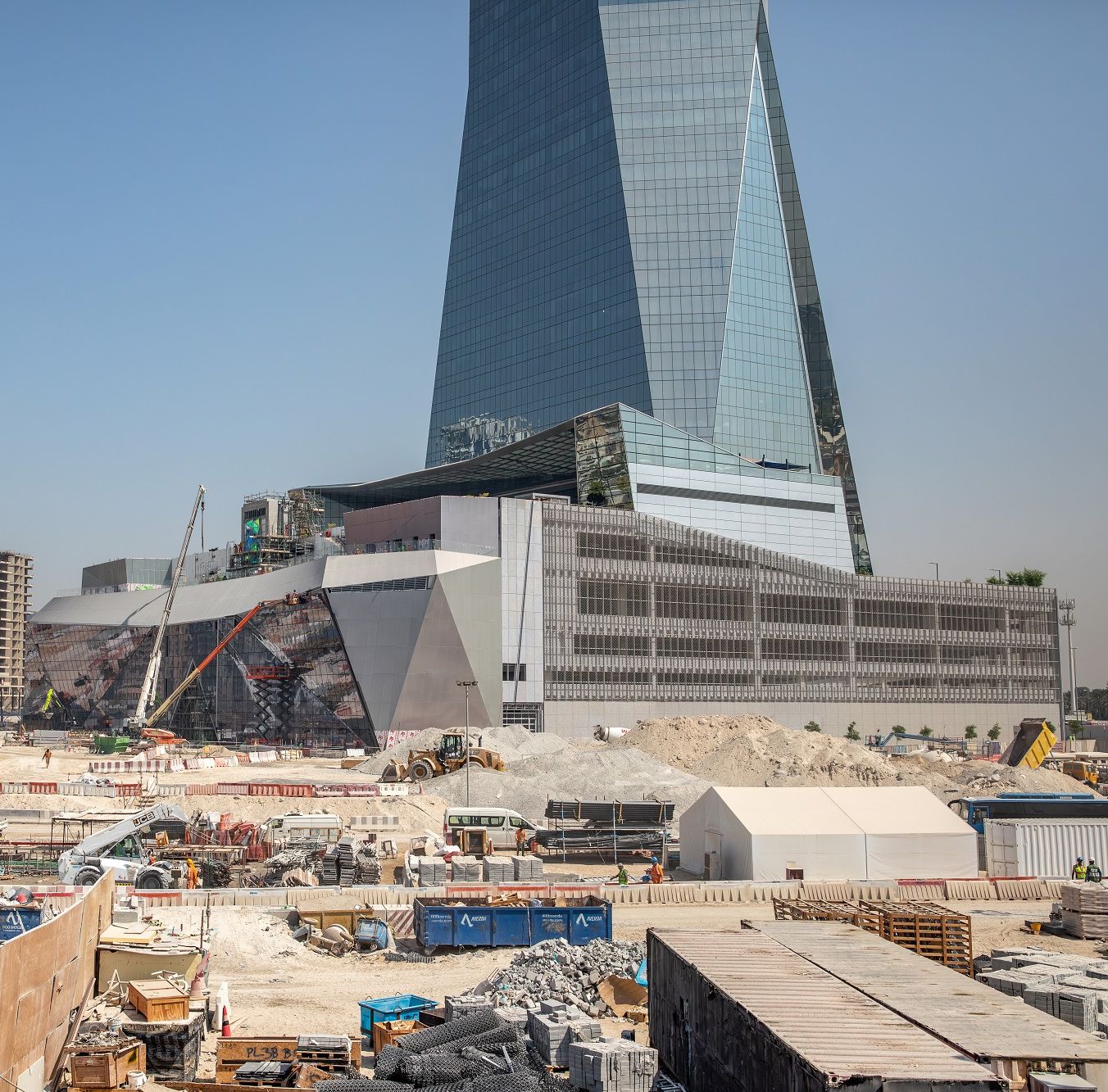 ©
Panos
©
Panos
-
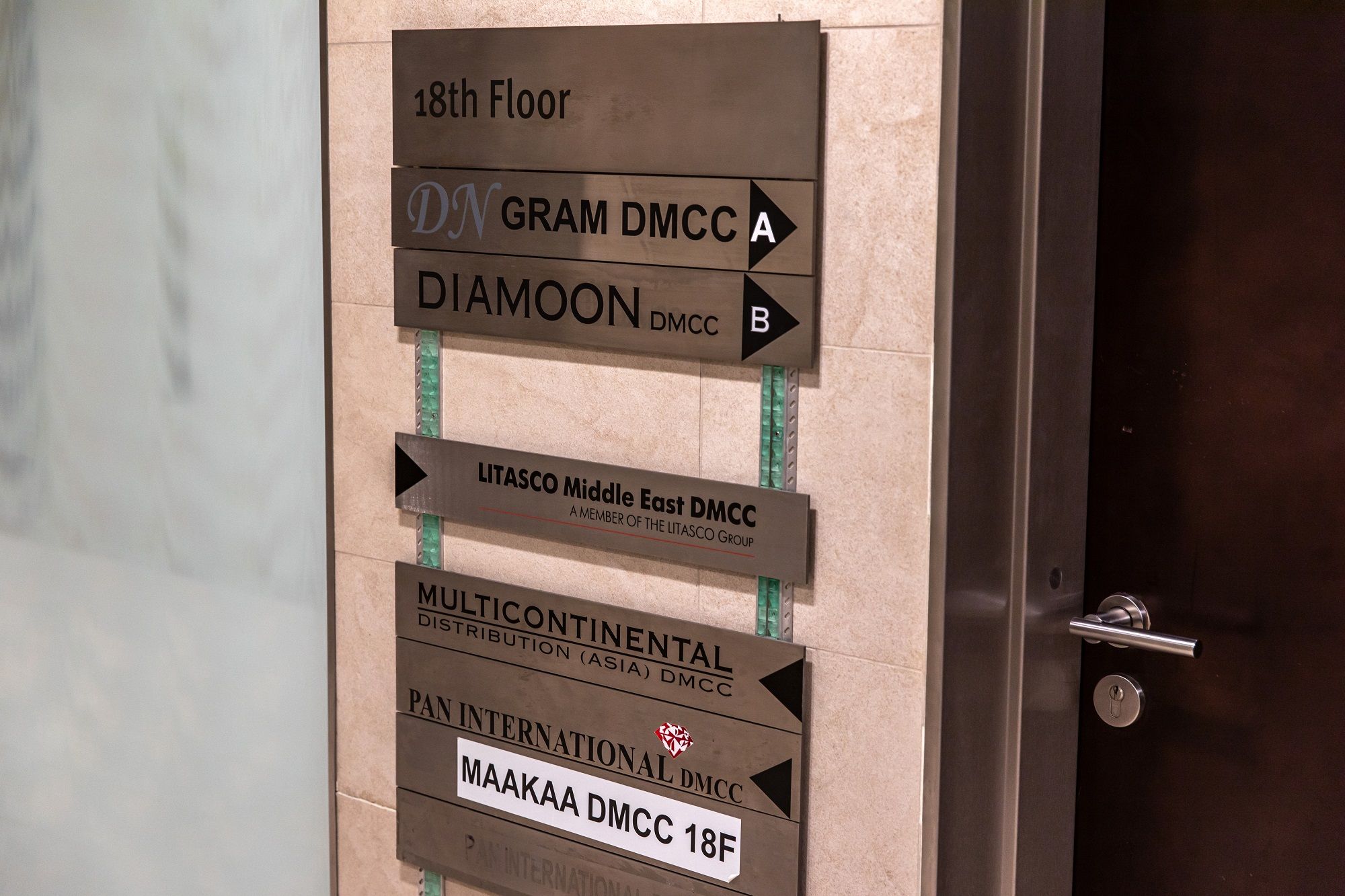 ©
Panos
©
Panos
-
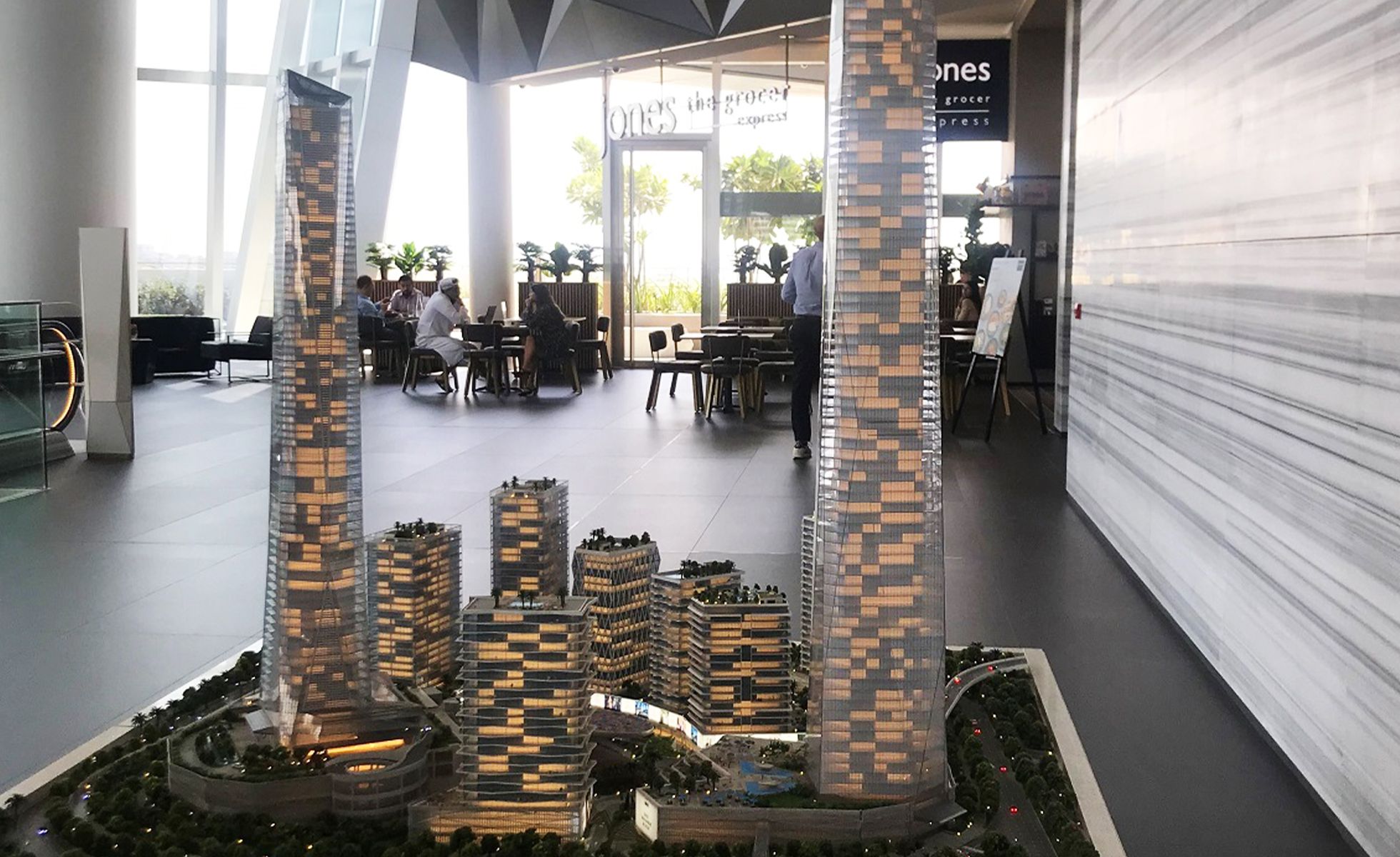 ©
Agathe Duparc
©
Agathe Duparc
Maximum openness paired with opacity
“Dubai wants to be a trading centre open to everyone, to attract as much money as possible. Despite some improvements, there are still many compliance loopholes in the incorporation process,” explains a compliance specialist who has been living in the Emirati city for years and running his own thriving business.
The Emirati authorities are reluctant to clarify certain situations, which offers numerous advantages during a time of sanctions. The Dubai Multi Commodities Centre, for example, promises to register any new company or subsidiary and obtain a licence in no more than two weeks, with minimal due diligence procedures involved. This means, for instance, that there is no need to provide the name of the ultimate beneficial owner (UBO) of the company, but only that of the shareholder, who can therefore be a mere frontman.
DMCC promotional video (2023)
When asked about this point, the spokesperson of the free zone replied in writing that: “All applications for Free Zone company registration are rigorously assessed by DMCC in line with local law and through a clear, comprehensive and robust compliance process.”
Dubai has for years been singled out for providing a haven for major tax evasion and money laundering networks, as documented by the Dubai Papers and Dubai Uncovered investigations. In February 2022, the Financial Action Task Force (FATF), the international body responsible for monitoring compliance with the minimum anti-money laundering standards, included the United Arab Emirates on its “grey list”, due to strategic failures in terms of tackling money laundering. The country is now under increased monitoring, and the authorities have pledged to close the loopholes out of concern for projecting the right image to international markets and investors.
Oil storage areas and ghost ships galore
From a logistical perspective, Dubai has much more to offer than Geneva and its adjoining lake. About 90 percent of Russian barrels traded by Dubai entities don’t land on Emirati soil, but are exported directly from Russia, mainly to Asia, Africa and Latin America. But Jebel Ali, its commercial port – the 9th largest in the world – is booming. According to the specialist online magazine MEES, imports of Russian petroleum products, which were almost non-existent before September 2022, now account for 10 percent of its activities. Litasco is already renting space there. As a result of this influx, a new oil storage and blending terminal (blending oil of different qualities) is to be built. On the Arabian Sea (Indian Ocean), the port of Fujairah, 120 km east of Dubai, is the main storage hub in the United Arab Emirates, also benefiting from the Russian windfall.
-
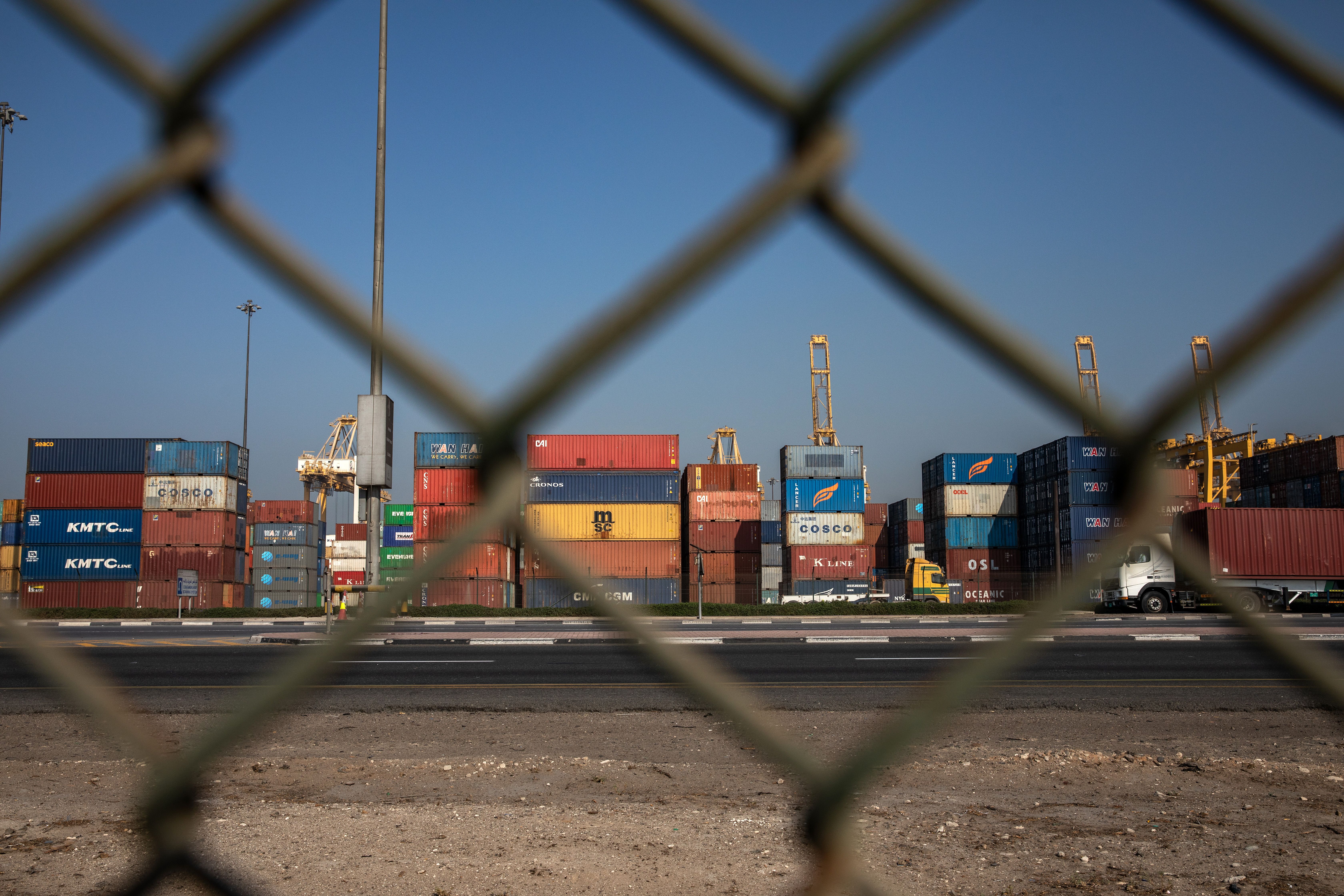 ©
Panos
©
Panos
-
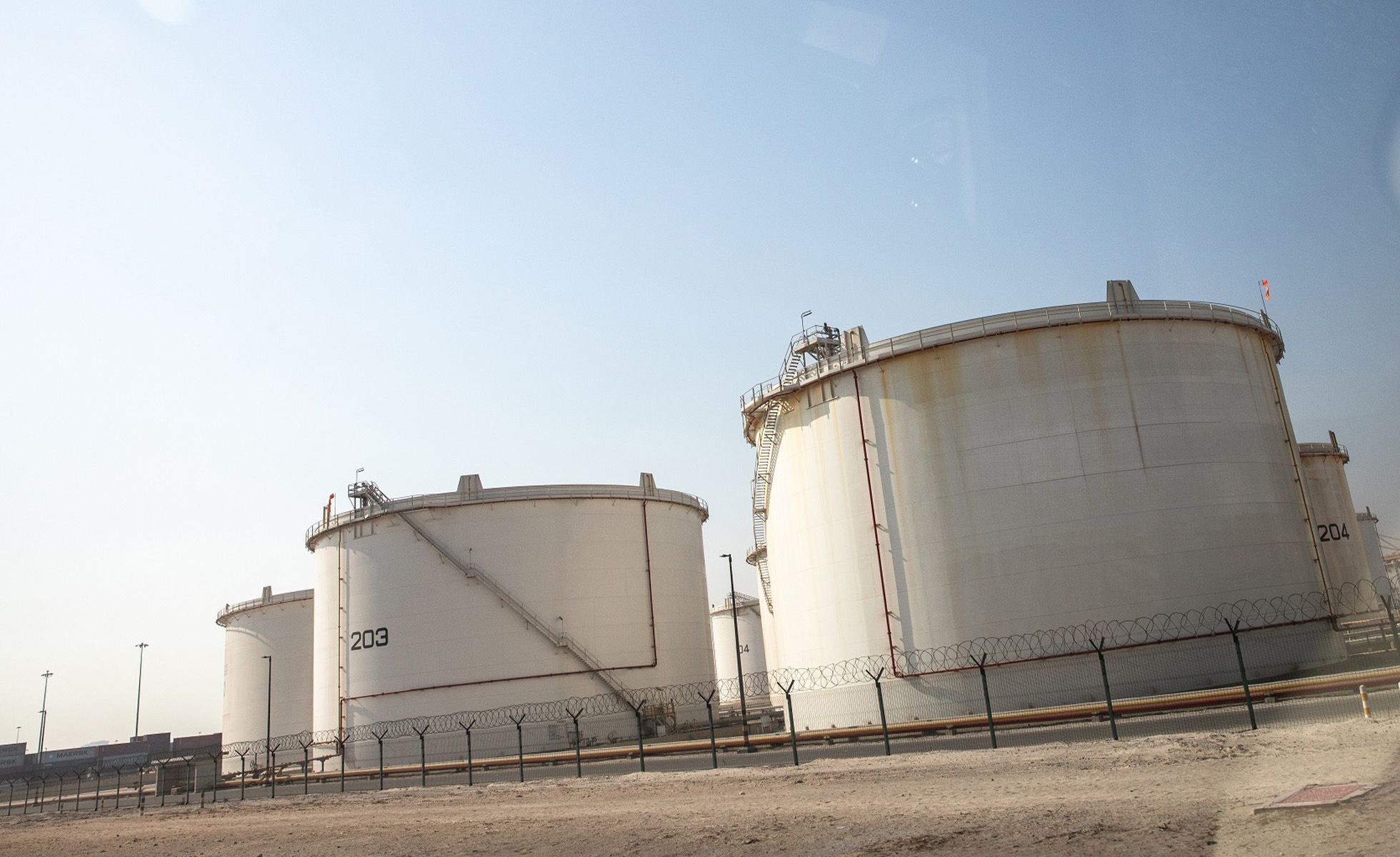 ©
Panos
©
Panos
-
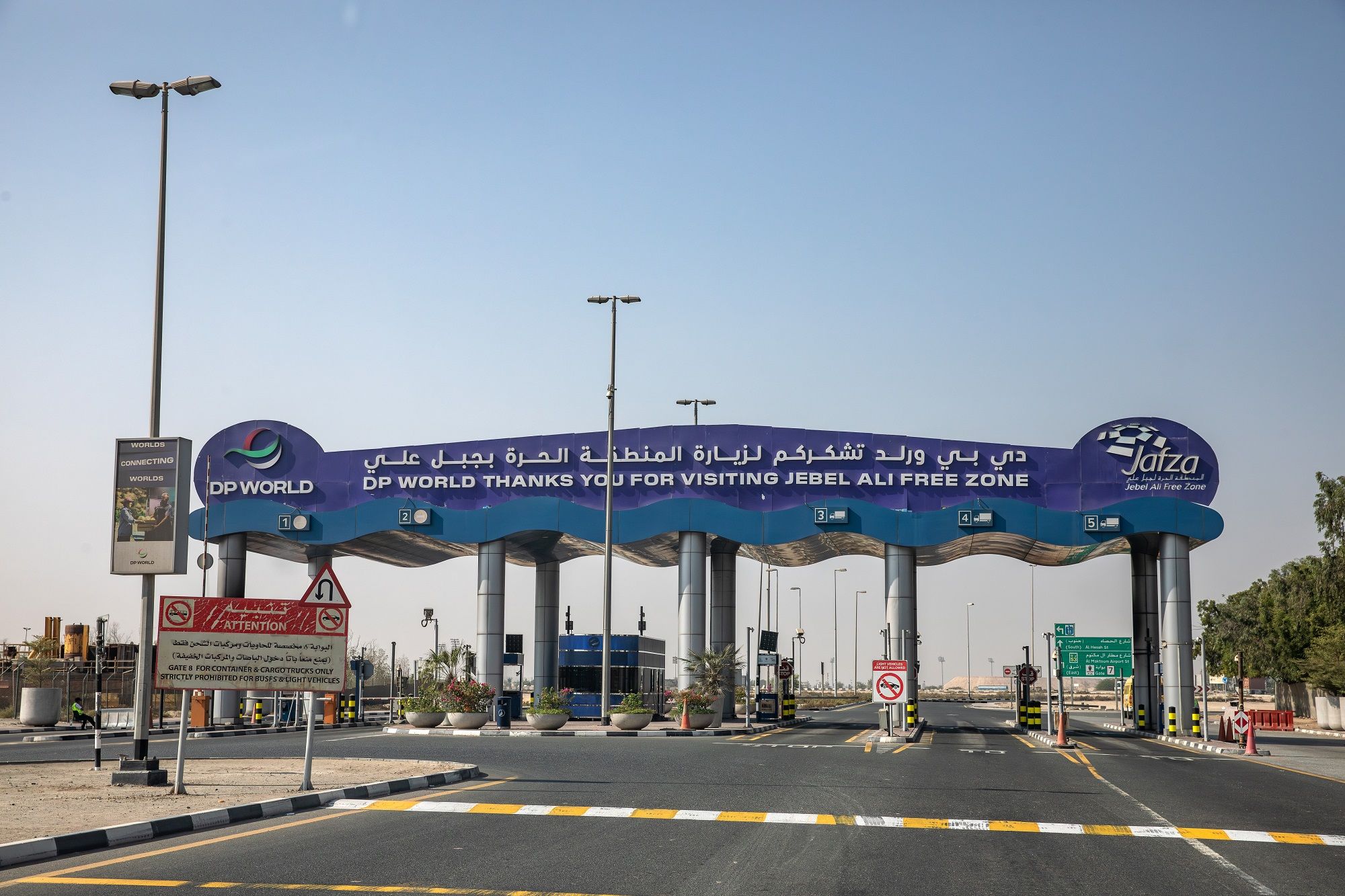 ©
Panos
©
Panos
In fact, Dubai is simply going back to its first love. In the 1970s, it was revenue from black gold – a sector which currently accounts for 65 percent of the UAE’s GDP – that allowed the small fishing village, whose only attraction was the pearl trade, to become transformed in a few decades into an ultra-modern city, air-conditioned all year round and connected to the whole world.
The small Emirati haven also plays a key role in allowing Moscow to transport its oil under the radar. According to an analysis performed by CREA, a Finnish organization that monitors the enforcement of oil sanctions against Russia, 41 percent of what are now known as “ghost ships” are registered in the United Arab Emirates, with 12 percent in India and 8 percent in Vietnam, Hong Kong and China. These are often outdated tankers which transport Russian oil above the price cap and deal with non-Western insurers. These ships regularly go dark by turning off their transponders and engage to their heart’s content in ship-to-ship transfers (STS) in order to mask the Russian provenance of the products.
 ©
Panos
©
Panos
This shadow fleet is said to number more than 400 vessels, which also pose a serious risk of oil spills in the oceans. This is in addition to around a hundred vessels operated by Sovcomflot. In the Spring of 2022, the Russian state-owned shipping giant transferred their management to its Dubai subsidiary Sun Ship Management, (now under sanctions in Switzerland), and then partly to a new entity, also domiciled in Dubai.
Moves organised by Swiss lawyers
Meanwhile in Switzerland, the task of setting up companies in Dubai is keeping some lawyers busy. One of them has told us that he regularly travels to Dubai to help Russian clients buy property and open bank accounts.
He was recently involved in assisting a trading house, which had been registered in Switzerland for 25 years, in relocating most of its staff. The company, which he declined to name, maintains a presence in Switzerland, while one of its Russian shareholders still lives in Geneva, but now operates from Dubai. It had seen its financing facilities cut off by Swiss banks which, since the sanctions, have refused to touch Russian oil. The Dubai-based entity is now financed from its own funds, thanks to private investors or by calling on Russian banks. It has also redirected its flows to Brazil, India and South Africa. “You can make payments in Russia from Dubai, whereas, in Switzerland, even when everything is perfectly legal, the institutions refuse to do so,” he explains.
“My clients are warmly welcome here and they live in perfect harmony with the Ukrainians, far away from the war” adds the lawyer. “Russian flags are on display on some hotels and several flights operate daily between Moscow and Dubai, without any visa requirements. All you have to do is buy a property to get a residence permit.”
We also spoke with another Swiss lawyer, a leading fiduciary in the industry offering his services in Dubai. “This week, we received five requests to set up businesses from companies registered in Switzerland that trade in grain, oil, minerals, art and private jets. We receive an average of 12 cases per month, which represents between 10 to 15 percent of our business. But the sanctions are by far not the primary motivation for my clients,” he explains, comparing Dubai to “an all-electric vehicle”, while Geneva remains “a diesel car”. “It’s very rare that groups operating in international trade with links to Russia are only now discovering Dubai,” he says, recalling that Russian oil, gas and agricultural commodity traders began to appear in the United Arab Emirates as early as the mid-1990s.
Dubai remains second to none when it comes to taxation. While the government has just introduced a 9 percent tax on corporate profits, those companies that are registered in free zones and do not operate in the UAE can obtain a 50-year tax exemption. Their employees pay no income tax and residence permits are issued in record time.
Russophile Dubai
In 2022, more than one million Russians stayed in the United Arab Emirates, a 60 percent increase compared to 2021. Many of them are not mere tourists. In the aftermath of Russia’s invasion of Ukraine, major Russian companies chartered planes to provide protection for their employees and enabled them to avoid being called up. The wealthiest people bought companies and property, and obtained residence permits.
 ©
Panos
©
Panos
The Russian community is particularly fond of the Dubai Marina residential area, resembling something halfway between Gotham City and Disneyland, offering esplanades, restaurants and luxury stores. It has also taken over Bluewaters, a small man-made island near Marina Beach. You will hear only the language of Pushkin spoken there.
“It's often said that Bluewaters is part of the territory of the Russian Federation,” joked a businesswoman we met at Angel Cakes, a Moscow bakery chain. The 30-year-old, who works in the luxury goods sector, continues to travel back and forth to Moscow, “until Putin decides to shut everything down”. Like many of her compatriots, she had regular dealings with Switzerland. She says that she was told “overnight” by her Swiss bankers to transfer her money elsewhere.
Oligarchs who are facing sanctions are also discovering the joys of Summer, when the thermometer can rise above 55 degrees. Persona non grata in Switzerland, Andrey Melnichenko, a former resident of St. Moritz and founding shareholder of the fertilizer giant EuroChem as well as SUEK, Russia’s largest coal producer, has made it his new residential base. The businessman is scrambling to restore his reputation, as a recent interview with the Financial Times shows.
“Pop-ups” close to Rosneft and sleights of hand in Dubai
Since the embargo came into force, English-speaking media have been trying to unravel the mysteries of the Dubai companies that are now among the largest purchasers of Russian oil. According to a recent investigation carried out by Bloomberg, Murtaza Lakhani, whose company Mercantile & Maritime (MME) was a loyal partner of Rosneft before the war, was allegedly involved in setting up three organisations in Dubai in 2022, even though, on paper, he does not own any shares in these companies. These include Amur II FZCO, which is a shareholder in Amur Investments Limited, and Tejarinaft FZCO. Amur Investments Limited and Tejarinaft FZCO are among the largest buyers of Russian crude transported by sea. Lakhani is now under investigation in the United States on suspicion of evading oil sanctions, as reported by the Wall Street Journal. Recently, the businessman has made it a point of honour to assert through his spokespersons and lawyers that his company MME has completely withdrawn from trading with Russia since July 2022. Until September 2022, his business affairs were conducted through Switzerland, where the Rosneft network was firmly entrenched before the war in Ukraine, as revealed by Public Eye.
 ©
Panos
©
Panos
During our analysis of Russian customs declarations, other companies’ profiles were as intriguing, such as that of Demex Trading Limited DMCC, a trader that is little known in the sector. Between January and July 2023, Demex was the 5th largest private buyer of Russian crude oil, with a minimum volume of 5.6 million tonnes. That's equivalent to eight Aframax tanker cargoes per month.
As we have documented, on paper the 100 percent shareholder of this structure is a Seychellois citizen who, between 2010 and 2021, held the position of accountant or director in more than 100 UK offshore companies.
According to a document we obtained, in September 2022, four Russians featured among Demex’s senior executives, including Mikhail Mezhentsev, director of Transnefteproduct between 2008 and 2010, the operator of Russian state-owned giant Transneft, which controls all pipelines in Russia. Several sources indicate that Mezhentsev also works for Concept Oil Services Limited, a company based in Hong Kong. Before the war in Ukraine, Concept Oil was on Forbes’ list of the largest buyers of Russian crude oil, known for sourcing from “malychis” (babies), Russia’s small producers. Its official owner, Michael Zeligman, a Latvian citizen who lives in Monaco, has already been in reports from several media outlets.
Based on the customs declarations we have consulted, as soon as the embargo came into force, Concept Oil Services Limited all but disappeared from the trading records. It seems like Demex Trading Limited DMCC had taken over the baton, sourcing from almost the same Russian suppliers – mainly Irkutsk Oil Company (INK) and RNG JSC.
For several years now, Concept Oil Services Limited has been suspected of being controlled by former Transneft officials. According to an investigation conducted by Important Stories, an independent Russian media outlet, the trader was allegedly sponsored by the former son-in-law of Nikolai Tokarev – the current head of Transneft and close to Vladimir Putin – and by Mikhail Arustamov, the former first vice-president of Transneft. Interestingly, Mr. Arustamov, a Swiss resident, bought a property in Geneva this summer worth CHF 3.8 million, as revealed by Bilan magazine.
Demex and Concept Oil did not respond to our questions.
Subtle requests from US to major traders
For several months, Washington and its European allies have been worried that the Russian oil market is now dominated by companies which may be controlled by the Russian government and which, most of the time, charter ships belonging to the notorious Russian “shadow fleet“.
As we learned, in late Spring 2023, several major oil traders in Geneva were discreetly contacted by officials from OFAC – the U.S. agency responsible for enforcing sanctions – and the State Department. “They said they were very concerned that the market is now in the hands of small, obscure companies close to the Kremlin, with ramshackle ships operated by poorly trained crews. They encouraged us to get back into the Russian oil trade,” said a person employed by one of these trading houses.
 ©
Panos
©
Panos
According to our sources, these requests were repeated this Summer during the informal visit made to Geneva by representatives of the US Treasury, as reported in the Swiss press. SUISSENÉGOCE, the umbrella organisation for Swiss traders, and Switzerland’s State Secretariat for Economic Affairs (SECO) joined the meeting, which was initiated by Gunvor and Trafigura, and focused on the global energy supply.
Messages from Washington have also reportedly been sent to some of the major banks involved in trade finance to get back to dealing with the Russians. After getting seriously burned by the fines imposed in recent years on certain establishments for violating the US embargo, none of these banks would have been forthcoming. “Our banks have told us that if we want to resume business with Russia, using our own funds or through other financing channels, they will not hold it against us. But they still refuse point-blank to finance anything related to Russian products,” says the same person employed by a Geneva-based company.
In theory, apart from reputational risk, there is nothing to prevent Western traders from resuming trade with Russia, as long as the oil is bought below the highly publicized price cap and the goods are delivered to countries that are not applying the sanctions. Up until until the end of june 2023, conditions were even conducive to a resumption of business since, on the markets, Urals oil, the main export grade of crude oil from Russia, was trading below $60 per barrel, the price cap for crude.
But since July, that same barrel has been trading above $60, making conditions far more risky, although Dubai-based entities – which are not required to comply with sanctions – can still pick up the slack. “Many traders would like to see the price cap readjusted upwards. This is the condition under which they will get involved in the Russian oil trade,” said an analyst at a trading house based in Dubai.
The major traders are remaining vigilant. Since the embargo on Russian crude oil and oil products came into force (in December 2022 and February 2023), Vitol, Trafigura and Gunvor have only appeared on the fringes. Last June, Gunvor declared to the Financial Times having bought 700,000 tonnes of Russian oil products between January and April 2023. According to our set of customs declarations, its subsidiary in Dubai – Gunvor Energy Trading DMCC – has only transacted very small volumes of Russian oil products, a few tens of thousands of tonnes, since the beginning of the year. In the case of diesel, the trader says that it has only traded one cargo load through its Dubai entity since February 2023, “well within price cap”.
Gunvor explains that it has put together “team of sanctions experts as full-time staff members of the legal team, dedicated solely to ensure respect with all applicable sanctions.” “To adhere to sanctions is to undertake transactions in a legal manner—not necessarily to stop trade altogether (with Russia, Editor’s note), which would achieve the opposite of their stated purpose” the trader added.
See Gunvor’s complete response.
Vitol operates a subsidiary in Bahrain – Vitol Bahrain EC – which has also only traded small volumes, comparable to Gunvor’s Dubai firm, since the beginning of 2023, according to our analysis. Vitol declined to comment on these trades but underlined that “[a]ny Russian origin products traded by Vitol would be traded in full compliance with the relevant sanction regimes”. In June 2023, the trader registered a branch in the free zone Dubai International Financial Center (DIFC): Vitol Bahrain (DIFC branch). According to Vitol, the latter is not physically trading oil.
See Vitol’s complete response.
For the time being, only Litasco Middle East DMCC is operating at full capacity, purchasing large volumes mainly from its parent company Lukoil. But the customs declarations analysed show that the Geneva-based entity Litasco SA also continued to buy Russian oil from Geneva, at least until July 2023. This concerns to transactions to Bulgaria, the only country in the EU to be allowed to continue seaborne imports of Russian oil.
When asked about these activities, Litasco SA simply replied that it “is complying with all applicable laws and regulations, including the G7 price cap rules”.
The Geneva-based entity indicates that a complete separation has been established with the Dubai-based entity. “LITASCO SA does not own or control LITASCO Middle East DMCC. The partially common name of the two companies is a legacy of the time when LITASCO Middle East DMCC was a subsidiary of LITASCO SA,” explains its spokesperson. Litasco Middle East DMCC did not respond to multiple requests for comment.
See Litasco SA’s complete response.
“Chinese wall” between Dubai and Geneva?
“In the case of large trading groups, how can we completely isolate the desk that sells Russian oil in Dubai?” asks the employee of a large Swiss trading house for whom “this story of the Chinese wall is a bit of a mystery”. “Financial risks can be calculated independently of each other, but if the company is owned by a single shareholder or a group of shareholders, the losses of one must be offset by the gains of the other. All positions need to be consolidated,” he stated.
A Dubai-based trader argues that “to be certain that there is a total separation between a Swiss company and the Dubai entity, you have to ask yourself at least two questions: what control does the former have over the conduct of operations in Dubai, and does it benefit from the profit made in Dubai?”.
According to our sources, the State Secretariat for Economic Affairs (SECO), which is responsible for enforcing the oil embargo against Russia, has sent letters to this effect to several traders, including the Geneva-based Paramount Energy & Commodities in April 2023, as disclosed by the Financial Times. Just after the outbreak of the war in Ukraine, this little-known company, which Public Eye has investigated, was the top buyer of ESPO Blend crude oil at the port of Kozmino, near Vladivostok. From June 2022, when an embargo on Russian oil started taking shape, a company named Paramount Energy and Commodities DMCC, which had been in existence since December 2020, took over. The lucrative trade was able to continue until January 2023, when the ESPO price had already sat above the price cap for multiple months, according to the customs data we consulted.
On 8 November 2023, the UK announced sanctions targeting the Dubai-based entity. It is “known to employ opaque ownership structures and has been used by Russia to soften the blow of oil-related sanctions”, the Foreign Secretary indicated in a press release. British sanctions also apply to Swiss national François Edouard Mauron, who was company director until May 2023. On paper, Paramount Switzerland and Paramount Dubai nowadays are two fully separate entities.
 ©
Panos
©
Panos
But how can we ensure that this “Chinese wall” is not a smokescreen? In Switzerland, the Embargo Act does not explicitly define the territorial scope of sanctions. For several months now, SECO has been engaged in a balancing act, explaining that “legally independent subsidiaries of Swiss companies established abroad or Swiss nationals domiciled abroad are in principle not subject to Swiss law”. This specific Swiss feature allows for many arrangements. In other words, it is enough for a Dubai-based company to be, on paper, run and managed completely independently, and not have the same shareholder as the Swiss organisation, for it to escape prosecution in the event of a violation of Russian oil sanctions.
Moment of truth for SECO
In an increasingly tense international environment and with oil prices likely to remain above the price cap for a long time, SECO must answer these questions as soon as possible. Last September, the National Council adopted a postulate asking it to analyse how “sanctions against Russia in the commodity trading sector are currently being complied with and where loopholes remain”. SECO’s recently reorganized sanctions division has strengthened its team responsible for analysing alleged infringements. The report requested by the Lower House of Parliament will be a good indicator of SECO’s knowledge of the new realities of the Russian oil market and the role played by traders based in Switzerland and their entities abroad. Russia’s relentless war of aggression against Ukraine requires a swift and effective response.

